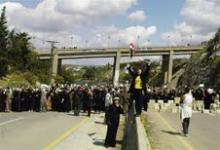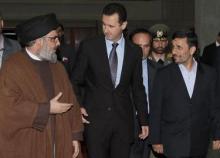
Women hold an anti-government demonstration in Banias, Syria, on Wednesday, April 13, 2011, demanding authorities release people detained during a crackdown on opponents of the regime. (AP Photo)
(CNSNews.com) – Iran officials and state media continue to ignore, downplay, or see conspiracies behind the anti-government protests and violent clampdown in Syria, in sharp contrast to their response to unrest elsewhere in the Arab world.
As protests swept countries including Tunisia, Egypt, Bahrain, Libya, Yemen and Jordan in recent months, supreme leader Ayatollah Ali Khamenei and other Iranian religious officials have repeatedly sought to associate the protests with the Islamic revolution that brought the mullahs to power in Tehran 32 years ago.
“Almost every analyst in the world believes that the current popular movement in the Middle East and North Africa was inspired by the uprising of the Iranian nation in 1979,” declared a report posted on Khamenei’s Web site last week.
While Iranian media report extensively on the unrest in most of those countries – with particular and sympathetic attention paid to protests in Bahrain, where majority Shi’ites are agitating against a minority Sunni monarchy – the situation in Syria gets very different treatment.
Iranian media outlets are either disregarding the Syrian turmoil altogether or echoing Syrian President Bashar Assad’s claims that it is being instigated by foreign elements.
The semi-official Fars news agency has accused Western media of exaggerating the death toll in Syria.
On Wednesday, Fars carried a report on a speech about the Arab protests, delivered by the chairman of the Assembly of Experts, a top body of religious scholars.
The report, which quoted Ayatollah Mohammad Reza Mahdavi Kani as saying Arab regimes must take heed to their citizens’ demands, referred to “revolutions” in Tunisia, Egypt, Libya, Yemen and Bahrain, and to “other anti-government unrests” in Saudi Arabia, Jordan, Oman, Kuwait and Algeria. Syria did not get a mention.
Human rights advocacy groups report that as many as 200 people have been killed in Syria since a government crackdown on protests began in mid-March.
That figure, while significantly lower than the estimated number of deaths in the Libyan conflict and the number of those killed in the Egyptian revolt, is fast approaching the Tunisian death toll. It is roughly twice the number of deaths in Yemen and more than six times the number of deaths in Bahrain.
Early this week Tehran Times, the self-described “mouthpiece” of the Islamic revolution, carried in full a Syrian Interior Ministry statement accusing instigators of infiltrating protests and “opening fire randomly.”
The statement said that despite government responses to calls for reform, problems were still being caused by “some spiteful individuals, outsiders and those who were compelled by known foreign parties, accompanied by blatant instigation by satellite channels and Internet sites.”
On Wednesday, the Tehran Times-affiliated Mehr news agency carried a report quoting Iran’s ambassador in Damascus calling for an investigation into the killing of protestors – in Bahrain, not in Syria.
Conspiracies
Assad is Tehran’s closest ally in the Arab world, and has defied the Obama administration’s attempts to draw him away from Iran and from their common non-state ally in Lebanon, the Shi’ite terrorist group Hezbollah.

Syrian President Bashir Assad and his Iranian counterpart Mahmoud Ahmadinejad meet with Hezbollah leader Hassan Nasrallah in Damascus in February 2010. (Photo: Hezbollah/Moqawama Web site)
Iran’s foreign ministry on Tuesday elaborated on the foreign conspiracy angle.
“What is happening in Syria is a mischievous act of Westerners, particularly Americans and Zionists,” ministry spokesman Ramin Mehmanparast told a press briefing.
“With the help of their media they are trying to create an artificial protest somewhere or exaggerate a demand of a small group and present it, instead, as the demand and will of the majority,” he said. “No one should be fooled by this trick that Americans are playing.”
Mehmanparast said Western powers “want to avenge some countries like Iran and Syria, which support the resistance” – an apparent reference to Hezbollah, which styles itself “the resistance.”
Iran’s Press TV, which is semi-official and gets state funding, carried a report by a Tehran Times editorialist, Hassan Hanizadeh, who also saw foreign plotting behind the protests in Syria, but in his case blamed them on Jordan and Saudi Arabia.
Hanizadeh noted that the Syrian upheaval had begun in the southern city of Dar’aa, which is near the border with Jordan.
In the case of Saudi Arabia “which often bows to U.S. and Israel’s policies in the region,” he said the kingdom had been trying to destabilizing Assad since he became president after the death of his father, Hafez, in 2000.
“Therefore, with the start of popular protests in Tunisia, Egypt, Libya, Yemen and Bahrain, the Saudi regime saw an opportunity to drive a wedge between Tehran, Damascus and Beirut axis,” Hanizadeh said.
According to an article on the Web site of Rooz, a reformist news organization, some Iranian media are beginning to question the silence of government outlets.
“The closed political system in Syria is no different than those in other authoritative regimes such as Tunisia, Egypt, Yemen, Bahrain, and Jordan,” Rooz quoted one news site, Asre Iran, as commenting. “On what basis does the national radio and TV network ignore the Syrian events while covering similar events in other countries?”
On Thursday, State Department spokesman Mark Toner told reporters there was “credible information that Iran is assisting Syria” to put down the anti-government protests.
“I’m not going to get into details about that material assistance, but it’s of real concern to us,” he said.
The Wall Street Journal cited unnamed U.S. officials as saying Iran was aiding its Syrian ally in various ways, providing it with equipment to suppress protests and help in monitoring and censoring online media used to organize demonstrations.
On Thursday night, Syria’s official SANA news agency quoted a foreign ministry official as denying Toner’s comments.
“If the U.S. Department of State has evidences, why doesn’t it announce them?” the official asked.
Source material can be found at this site.









